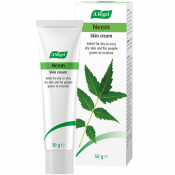An introduction to eczema
Eczema, otherwise known as dermatitis, is a chronic but not contagious skin condition that is responsible for around 84-90% of occupational skin disease.1
It affects around 10-20% of children and can even be seen in new-borns, manifesting as dry skin on their cheeks and scalp, commonly referred to as cradle cap.
The condition is less common in adults though, normally upsetting between 3-5%.2 It is believed that eczema can be caused by our genetics, as the affliction is more likely to appear if we have close relations that are also sufferers.
It can also be linked to atopic illnesses like asthma and hayfever, with atopic eczema being the most common variant of the condition.
There are seven common variants of eczema. They are:
- Asteatotic eczema
- Atopic eczema
- Contact eczema
- Discoid eczema
- Pompholyx eczema
- Seborrhoeic eczema
- Varicose eczema
Each type of eczema has its own selection of symptoms, characterised by a few commonplace side-effects that are prevalent throughout all forms of the disease, such as itchiness, inflammation etc.
The different variations also have their own distinctive triggers and causes, some of which can be found in other forms of eczema, of which are unique to that particular variant.
1http://eczema.org/what-is-eczema
2http://www.netdoctor.co.uk/conditions/skin-and-hair/a3605/what-is-eczema/
Epidermis
Eczema revolves around the strength of your epidermis, the most outer layer of your skin.
When you have healthy skin, your epidermis is supported by a network of fats and oils. These fats and oils are crucial to your epidermis, as they enable skin to retain moisture and prevent harmful bugs and bacteria from entering the body.
In eczema, the epidermis is weakened as your body is not producing enough fats and oils, causing skin to lose water retention and become dry and brittle.
This allows bacteria to penetrate the epidermis and makes your skin more vulnerable to abrasive irritants and allergens, which can strip away more essential oils from your skin.
Genetics
Why does your body not produce enough fats and oils?
There are several different answers to this vital question, some of which are linked to your diet and digestion but unfortunately, the answer can sometimes lie in your genes.
Some research has suggested that eczema could be the result of a defective gene that inhibits your production of filaggrin. Filaggrin is a protein found in the epidermis and it is vital in the growth of new skin cells.
Without filaggrin, your skin can start to lose essential fats and oil, leaving it dry and brittle, stimulating the typical symptoms of eczema.3It’s estimated that 10% of the population are born with a filaggrin deficiency.4
Despite this information, eczema is not classed as a ‘genetic illness’ although your genes can play a role in several different variants of the condition.
Sometimes though, your eczema symptoms can be linked to other areas of your body, such as your immune system and stomach function.
3http://eczema.org.au/dry-skin-and-the-filaggrin-gene/
4http://www.flawlessprogram.com/winter-eczema-are-you-filaggrin-deficient/
Immune system
Your immune system is your body’s first line of defence against pathogens and viral infections.
Your immune cells patrol your body, searching for antigens and bugs. Once they have located a virus or pathogen, they will stimulate the release of inflammatory IgE antibodies, in order to flush out the intruder and accelerate the healing process.
In the case of eczema, this immune response can sometimes be a curse rather than a blessing.
If your immune system is paranoid and hyperactive, it can sometimes react disproportionately to a potential threat, triggering wave after wave of inflammatory chemicals. These chemicals, like histamine, dilate your blood vessels and can stimulate the symptoms of eczema.
However, the reverse is also true. If your immune system is weakened or exhausted, then it will not have the strength to combat allergens or irritants, allowing bacteria and other pathogens to permeate your epidermis, leading to an episode of eczema.
What can weaken your immune system?
A balance then needs to be struck – if your immune system is perpetually stressed, it can over-react, yet if it is too relaxed and sluggish, it will not function correctly. So what can cause the immune system to respond this way?
The answer usually lies in lifestyle habits, such as stress, nutrition and your gut health.
Each factor can play a role in influencing the strength of your immune system. Although more information is detailed on our ‘causes’ page, for now let’s concentrate on your gut health.
Gut health
Your gut is responsible for breaking down your food and passing it on to the lower intestine.
It’s estimated that around 70% of your immune cells can be found in your gut so it already can have an impact on your immune system.
However, if your stomach is unable to break down food or contribute to the absorption of essential minerals such as calcium or zinc, then your whole body is going to suffer as a result.
Now, your gut function can be influenced by a variety of factors, from the food you eat to an internal bacterial infection.
Nevertheless, once it is weakened, the gut can have a knock-on effect on your digestion and vice versa.
For example, constipation is a digestive issue that can cause an overgrowth of unfriendly bacteria in your gut. However, if you are also unable to digest your food properly, it can affect your gut’s population of bacteria as well, leading into similar symptoms.
Your gut will become inflamed and your immune system will struggle to cope with the increased demands being placed on it.
The liver
The liver is responsible for detoxifying your body, filtering waste products to your bowels or kidneys, to be expelled from the body as faeces or urine. Unfortunately, poor gut function can also have an impact on your liver.
If certain products, like processed foods, are not broken down properly it can place your liver under an increased amount of pressure. This, in addition to other habits, such as smoking or drinking can take its toll on this important organ and toxins will not be filtered properly, instead lingering in your bloodstream.
This is where your skin comes in. If the liver is not up to the job then other eliminating organs will have to take over the liver’s function, including the kidneys and skin.
This means that the impurities that the liver should have filtered from your body will instead be perspired through your skin, weakening your epidermis and leading to a potential outbreak of eczema.
The causes of eczema
While eczema has no definitive cause, we have just discussed several important factors that can influence an eczema outbreak, such as your genetics, your immune function and your gut.
However, these vast and important systems rely on a number of secondary stimulants.
Your diet, your lifestyle habits and your contact with irritants can all contribute towards whether or not you develop eczema – for more information, please read our causes page!
The symptoms of eczema
The symptoms that can arise as a result of eczema are well-known but they do share some similarities with the symptoms found in other skin conditions, which can lead to a misdiagnosis.
Dry skin is prevalent across all variants of the condition, with inflammation usually contributing towards irritation, itchiness and flaking.
If you want to find out more about the symptoms of eczema, you can read our generalised symptoms page, however if you are concerned about a specific type of eczema, please refer to that individual page.
The treatment of eczema
Eczema is common enough to merit a whole host of conventional, herbal and natural remedies.
While most patients will be anxious to treat their physical, external symptoms it is important that you consider the causal factors behind your outbreak.
Using a cream may temporarily soothe your skin but unless you deal with the underlying cause, your symptoms will just keep coming back.
Sometimes all you need are a few simple lifestyle and dietary changes – find out more on our treatments page!








